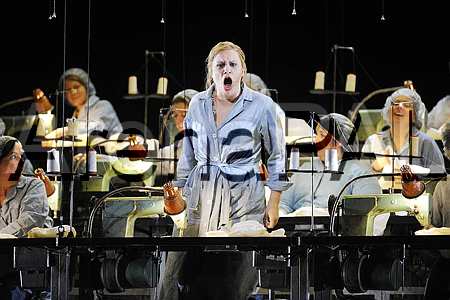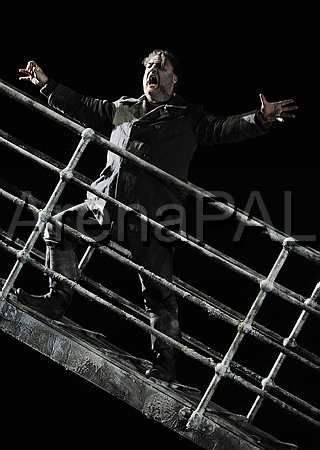I attended this on 26 February, and, as a result of the Royal Opera House Ticket Booking Fiasco, I had arguably the worst seat in the House, albeit one that I paid only £9 for - at the very end of the Lower Slips overlooking the stage.
It was played through without interval, from 8 pm until 10.30ish, which psychologically is a challenge especially following a day at work where the inclination is to have many cups of tea. In reality I have a robust bladder but I also have disproportionate anxiety! It does tend to deter one from eating and drinking before the event, and I was a bit annoyed at the 8pm start. I know this was to make the finish close to the customary 10.30, but I can't imagine many people would have complained at the customary 7.30pm start and 10pm finish.
I can't say it's my favourite of Wagner's operas, indeed, other than the ones I don't know, it may well be my least favourite.
I thought the production was interesting. I don' t think it was designed with the occupant of A113 in mind, though. There were many times when, even leaning forward, I could not see anything of the stage action. Acoustically it's a good seat, so I wouldn't avoid it in the future, especially if I am going to see the performance more than once.
The stage has a steep rake; at the front is a strip of water that is fed by a constant drip drip of water throughout the entire opera, which was directly opposite me. There was very little in the way of actual scenery. The middle act is set in a garment factory - so the Spinning Chorus becomes a sewing chorus, I suppose. The image of the Dutchman is represented by a toy model of his ship that Senta picks up and carries round from time to time, placing it in the strip of water and soon. Oh, and it's set in some indeterminate mid-twentieth century working class seagoing town "Peter Grimes! Peter Grimes!"
I have this on CD and I did watch on borrowed DVD (before I had the means to copy DVDs) the Welsh National Opera's version, set in Outer Space, which was shown on S4C the weekend we were having problems with satellite reception due to cranes...years ago. I have also had it on my mp3 player for years, so the music is all in my muscle memory, even if not necessarily in the right order - it has been suggested to me that it's a bit 'not right' to listen to Wagner on random play...is that so? Am I a lone weirdo?
The thing is, it doesn't do a great deal for me musically. There are no passages in it that create that special feeling. There are passages in all the others that instantly travel from my ears through my brain to my lymphatic system and make me want to clench and stretch my muscles simultaneously. But not Dutchman.
 I have to confess that I was bored for large stretches. I didn't feel moved by the orchestra - I didn't get that Wagnerian blaze of complex sound; I didn't feel that there was an overall arch the work, which I feel instinctively is not only within Wagner's writing but is also crucial to one's enjoyment. I thought the Spinning Chorus and a lot of the stuff that surrounds it resembles early Verdi or best-forgotten Donizetti. I was almost wishing there was an interval so that I could leave.
I have to confess that I was bored for large stretches. I didn't feel moved by the orchestra - I didn't get that Wagnerian blaze of complex sound; I didn't feel that there was an overall arch the work, which I feel instinctively is not only within Wagner's writing but is also crucial to one's enjoyment. I thought the Spinning Chorus and a lot of the stuff that surrounds it resembles early Verdi or best-forgotten Donizetti. I was almost wishing there was an interval so that I could leave.
And then, something happened. It was just about the point that the Dutchman and Senta got together. I had just looked at my watch and clocked it as 9.40. It seemed that I had been there all evening, and there was still a long way to go. Something just clicked.
I saw the conductor wave his arms in that classic move also beloved by amateur conductors - All together now, loud! They all sat up and started giving it welly; meanwhile, on the stage, something special was happening. Bryn Terfel and Anja Kampe exploded, with some fantastic singing, and even better assumption of the characters.
The action moved on relentlessly, there were barnstorming choruses, and the rather confusing end - as far as I could tell, Senta did not kill herself. Apparently, this was to distance us from the misogyny of Wagner's interpretation of the myth, which merrily assumed that all's well with the world as long as women submit to men's needs. I think that rewrite is a bit patronising, actually. It's not exactly verismo anyway, what with the Dutchman having sailed the world for several hundred years only coming ashore once every seven years from his ship crewed by ghosts.
I enjoyed what I saw of the production, although most of it was out of my line of sight because of my poor seat. Throughout most of the first act I didn't really appreciate Bryn Terfel's character portrayal. He seemed to be somewhat detached from the action but I understood later how this contributed to his character. Not exactly a romantic hero, despite Senta's daydreams, and despite her infatuation at first sight, despite not knowing him to be her hero. He was sad and lonely, despairing and frustrated.
I had heard bad reports about his singing, notably that his voice had worn out in Act III on opening night. In Act I I heard some mediocre singing, that characteristic straining the words and notes through the side of his mouth, some sprechsang phrases low down in the register, and so did not look forward to Act III. To my delight he was mesmerising, his voice noble and beautiful. I am haunted by a still and measured presence, very spare yet naturalistic movements, as if he was an outsider looking in on a life he desired but could not have.
The most impressive singer was
Hans-Peter König, whose vocal lines were effortless and full of legato. I warmed to Anja Kampe, once I got used to her steely tone. she had moments of shrillness, generally a no-no in sopranos, but they were few, and didn't detract from a strong performance, although I didn't think that she created or projected much of a personality. Torsten Kerl was disappointing in a relatively small but important role, especially having impressed me so much in Die Tote Stadt. I enjoyed John Tessier, perhaps as much for his athleticism as his singing, and Clare Shearer was fine.
In my special seat I had an unusual view of the stage, or, more correctly, the wings. The overture plays while a dirty white shower curtain hangs down from the proscenium. It waves in the wind and water streams down it, to portray the storm that so clearly sounds in the music. My view was a stage hand standing and holding it and wiggling it; no doubt he had a counterpart on my side.
Throughout the entire opera water drips audibly into the strip of water at the front of the stage; this seemed to be directly opposite where I was sitting; again and again my eyes were drawn.
 Bryn makes his entrance (I think it's the first entrance, I may be wrong), by pulling a rope behind him. I was able to see stage hands in the wings reeling it out and in again. At one stage I noticed that, rather than being lit from the lighting gantry, the lighting came from a set up in the wings. From time to time I wondered about the purpose of a structure that resembled a small portable scaffolding set, also standing in the wings. It did not seem to be part of the lighting rig and I simply could not see its purpose. All became clear in the finale when the structure stretched upwards like an old-fashioned drying rack (or maiden) but metallic rather than wood. And out of it came a very steep gangplank, which, as far as I could see was the centrepiece of the scene where the Dutchman finally leaves land to rejoin his ship.
Bryn makes his entrance (I think it's the first entrance, I may be wrong), by pulling a rope behind him. I was able to see stage hands in the wings reeling it out and in again. At one stage I noticed that, rather than being lit from the lighting gantry, the lighting came from a set up in the wings. From time to time I wondered about the purpose of a structure that resembled a small portable scaffolding set, also standing in the wings. It did not seem to be part of the lighting rig and I simply could not see its purpose. All became clear in the finale when the structure stretched upwards like an old-fashioned drying rack (or maiden) but metallic rather than wood. And out of it came a very steep gangplank, which, as far as I could see was the centrepiece of the scene where the Dutchman finally leaves land to rejoin his ship.
Overall it was a mixed bag. I think an hour and a half was a long wait to get forty five minutes of magic. If the entire opera had been like the final scene of Act II and Act III it would have been a superb and unforgettable night. I am a bit sad I didn't have the chance to see it from a full view seat (but I'll live). I thought it a thoughtful and effective production, but I can't say I like the opera any more as a result - in some ways it has only served to highlight its position relative to the Ring, Tristan, Lohengrin, Tannhauser, Parsifal, and even Meistersinger, another one I don't love.

Comments